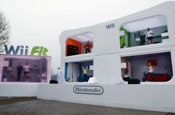Not long ago, computer-gaming was the preserve of spotty teenagers holed up in their bedrooms put-ting Lara Croft through her paces. However, with the advent of the latest generation of hardware, entire families have started playing virtual ten-pin bowling and exercising their brains with ‘mental training' games.
Nintendo's Wii has turned this previously static pastime into a full work-out with its action- and movement-oriented games where players compete against each other in computer-generated versions of sports. In April, the company added the Wii Fit to its hardware, including yoga and strength workouts. This took computer gaming into an area of leisure activity not previously seen.
In the handheld console market, the arrival of the Nintendo DS and its Brain Training series of games introduced a new audience to the sector.
This wider participation has brought the market into the main-stream and propelled sales. In 2007, the sector was valued at £2.5bn, with Mintel predicting it will reach £2.7bn by the year-end, representing growth of more than a third on 2003.
Between Nintendo, Microsoft and Sony there are an estimated 7.5m consoles in the market. This has propelled the sector to a value exceeding cinema, music, night-clubs and spectator sports. Moreover, it appears to be recession-proof. While people may cut back on holidays or restaurant meals, games sales are holding up.
Computer gaming is also becoming more widespread. According to TGI, less than 4% of seven- to 14-year-olds have never played these games.
The Wii, which entered the market in December 2006, is the market leader with about 3.5m consoles sold in the UK. Its relatively low initial price of £179 helped kick-start sales.
Nintendo's Wii titles such as Guitar Hero and Rock Band have also emphasised the social nature of gaming as well as boosting music sales, especially among bands' back catalogues. Its target audience is families rather than hardcore gamers.
The Nintendo DS leads in the hand-held category, and has succeeded in attracting all generations. Helped by a TV campaign starring Nicole Kidman, the DS has swept the market and sold an estimated 7m units.
Nintendo has battled hard in both the static-console and handheld markets, and the fierce competition between manufacturers has forced prices down.
Sony's PS3 had a shaky start, with limited big-name games and a high initial price of £425 hampering sales. However, its price has since dropped, and its inclusion of a Blu-ray DVD player has boosted sales. PS3 built on its predecessor's credentials, and is seen as the console of choice for the hardcore gamer. In 2009 it will introduce a movie-download feature, Play TV, as well as a virtual world, Home, which are expected to further strengthen the PS3's position in the console market and help Sony erode Wii's market leadership.
As broadband penetration has increased, the interactive and online gaming category has grown, in which Microsoft's Xbox Live leads the way.
Computer games have so far held up well as people cut back spending. This is reflected in specialist retailer Game's better than expected like-for-like sales this year, and many of the game publishers have also been turning in good financial performances.
By 2013 Mintel estim-ates sales of video-game hardware and software will have reached more than £3bn, a rise of 12% on 2008 at current prices.
Feature
Sector Insight: video games
LONDON - Computer games have successfully broadened their appeal and are in a good position to weather the recession.


